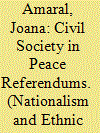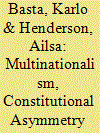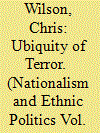|
|
|
Sort Order |
|
|
|
Items / Page
|
|
|
|
|
|
|
| Srl | Item |
| 1 |
ID:
181269


|
|
|
|
|
| Summary/Abstract |
This article asks whether civil society’s inclusion/exclusion in peace negotiations shapes their involvement in peace agreement referendum campaigns. It seeks to answer this question through a qualitative comparative analysis of the Northern Irish Good Friday Agreement and Cypriot Annan Plan experiences. It finds that civil society’s push for inclusion in Northern Ireland and in the Turkish Cypriot community was followed by their greater mobilization in the referendum that strengthened the overall “yes” campaign, while this did not take place in the Greek Cypriot community. Drawing on the literature on European integration referendums, it argues that peace referendums need to be preceded by inclusive negotiations.
|
|
|
|
|
|
|
|
|
|
|
|
|
|
|
|
| 2 |
ID:
181268


|
|
|
|
|
| Summary/Abstract |
Direct, large-sample measures of leadership preferences on both sides of ethno-territorial civil wars have not hitherto been available. As a result, statistical research diverges from case study research in omitting analysis of causes and consequences of leadership preferences. We present a new database that directly measures variation in the nationalist ideological preferences of state and ethnic rebel group leaders for post-World War II, ethno-territorial civil wars. Our measures, four-level ordinal scales of minimum acceptable demands, capture both the extent and the intensity of leaders’ upside goals. We examine institutional and cultural sources of these measures while controlling for material sources. Institutionally, regime type more strongly predicts state-side demands than rebel-side demands. Among cultural sources, we find that religious identity-based predictors are significant and powerful predictors. Among material sources, we find that both relative power and status quo predictors have weak statistical and substantive significance. These results indicate that variation in leadership preferences is best explained by institutional and cultural forces, rather than by material conditions related to relative power or status quo conditions.
|
|
|
|
|
|
|
|
|
|
|
|
|
|
|
|
| 3 |
ID:
181263


|
|
|
|
|
| Summary/Abstract |
The introduction to the special issue offers a six-points framework for analyzing both the impact of the pandemic on nationalism and the broader multinational state as well as the significance of multinationalism for the response to the pandemic. These points correspond to the following questions: (1) How has multinationalism (as a sociological fact and/or a political culture that has conditioned governance practices and institutional frameworks) shaped the response to the crisis? (2) How has the crisis affected the self-determination objectives and strategies of the nationalist movement? (3) Have national divides (as observed, for example, in public opinion and in statements from politicians) become more or less salient during, and as a result of, the crisis? (4) What issues have produced tensions between national communities, or between minority nations and the state? (5) What governments, parties, or individual politicians have most gained or lost from the crisis in terms of putting forward or managing self-determination claims? (6) What could be the impact of the crisis on the nationalist movement and on the multinational state as a whole?
|
|
|
|
|
|
|
|
|
|
|
|
|
|
|
|
| 4 |
ID:
181264


|
|
|
|
|
| Summary/Abstract |
This paper analyses the relationship between the COVID-19 crisis and multinationalism in Spain from two complementary angles. First, it provides an overview on how the multinational and decentralized character of Spanish territorial politics shapes the response to the crisis. We find that the management of the crisis reflects and exacerbates the main features of the Spanish territorial model as a case of incomplete federalism with severe intergovernmental deficits. Second, we analyze the effects of the pandemic on Catalan self-determination demands through a brief description of parties, public opinion and governmental reactions. We argue that Catalan secessionism faces several new impediments as a result of the pandemic, but we also find that the COVID-19 crisis provides a window of opportunity for this movement regarding grievance-building and regional governmental performance and salience. We conclude with a general reflection on the ambivalent impact of COVID-19 crisis on Spanish regionalism and territorial politics. Overall, the COVID-19 crisis does not seem to mean an improvement but a potential setback for the accommodation of national diversity.
|
|
|
|
|
|
|
|
|
|
|
|
|
|
|
|
| 5 |
ID:
181265


|
|
|
|
|
| Summary/Abstract |
This article explores how the asymmetric institutionalization of the United Kingdom’s multinationality interacted with the COVID-19 pandemic. The UK’s political elite has traditionally accepted the country’s multinational character, but democratic institutionalization of it occurred relatively recently and in a remarkably asymmetric manner. Only the UK’s minority nations possess devolved governments, while the largest nation, England, is governed directly from the center. This framework has consequences for the pandemic response. It has clarified the relevance of devolved legislatures, but also highlights continued resistance of the UK’s governing elite to acknowledge the multi-level character of the state.
|
|
|
|
|
|
|
|
|
|
|
|
|
|
|
|
| 6 |
ID:
181266


|
|
|
|
|
| Summary/Abstract |
Belgium is considered as a very divided multinational and federal state, with conflicts between representatives of its two main language communities regularly threatening its sheer existence. Moreover, at the outbreak of the COVID 19-crisis, Belgium was in the middle of a political crisis: ten months of failed attempts to form a new federal government left a minority caretaker government to deal with the crisis. When the second wave arrived, a new federal government was formed but its composition was strongly different than the Flemish government, which was lead by the Flemish-nationalist N-VA, a situation of incongruence between governments that generally reinforces political conflicts within Belgium. All this means that a very fragmented, divisive and conflictual COVID-response could be expected. Therefore, it is surprising that the response was largely uniform and national response. There was a political consensus that measures should be the same over the entire territory. This article details the institutions, policies and communication that created this national response and also explains the reasons for it. It also focuses on the problems that the distribution of competences posed to execute the response and what it means for the nationalist movement as well as for possible future constitutional reform.
|
|
|
|
|
|
|
|
|
|
|
|
|
|
|
|
| 7 |
ID:
181271


|
|
|
|
|
| Summary/Abstract |
The 2018 Central American migrant crisis, in which thousands of people traveled through Mexico in caravans toward the United States border, was a milestone in Mexican immigration policies. The humanitarian crisis evidenced the poverty and vulnerability to which migrants are exposed in their places of origin. At the same time, immigration policies in Mexico became more restrictive due to both internal and external political pressure and, as a result, the securitization measures have become more pervasive than all other migration control policies. This article suggests that this new approach to migration could be ineffective over the long-term, whilst becoming increasingly dangerous for migrants.
|
|
|
|
|
|
|
|
|
|
|
|
|
|
|
|
| 8 |
ID:
181267


|
|
|
|
|
| Summary/Abstract |
The federal political system we call the United States is both a multinational and a multiethnic state. Puerto Rico has been a peripheral part of the United States since 1898, and its inclusion in the outward edges of the U.S. state apparatus turns the U.S. into a multinational democracy, exhibiting a form of peripheral multinationalism. In recent years, the rise of Trumpism and the transformation of the Republican Party have energized those who envision an ethnonationalist view of U.S. national identity: a political momentum is strengthening, sustaining a nativist, white majority nation reaction that would revive ancestral racial and ethnic concepts of U.S. national identity. This of course is not a favorable development for the accommodation and the fair treatment of Puerto Rico within the U.S. federation and has multiple ramifications, including the foot dragging behind the Republican federal government’s response to the COVID-19 crisis of 2020–21, and the other major natural disasters that have impacted the island, especially the devastation caused by Hurricane María.
|
|
|
|
|
|
|
|
|
|
|
|
|
|
|
|
| 9 |
ID:
181270


|
|
|
|
|
| Summary/Abstract |
Despite ongoing debate, most definitions of terrorism agree that it involves violence against civilians by state or non-state actors intended to send a broader message to an audience well beyond the victims. The targeting of civilians to achieve a political or other goal is widely considered to differentiate terrorism from other forms of political violence. But as this article shows, many other forms of political violence against civilians by both state and non-state actors also hold communicative intent, including hate crimes, riots, group violence during and after conflicts and mass killing and genocide. Despite this, these forms of violence are rarely classified as terrorism. I contend that the concept of terrorism fails to differentiate between many forms of political violence. This article contends that the frequency with which militant actors (both state and non-state) use violence against civilians to intimidate and influence a broader audience means that the term terrorism should be abandoned in favor of a less emotive and selectively applied term. I propose the term Politically Motivated Killing of Civilians.
|
|
|
|
|
|
|
|
|
|
|
|
|
|
|
|
|
|
|
|
|